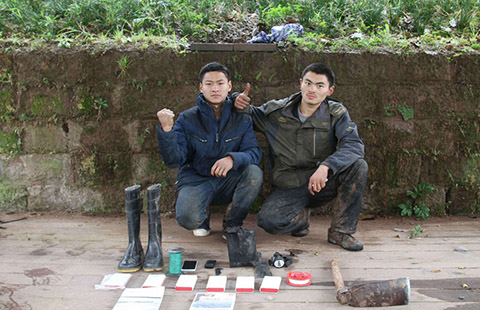Inmates' rights program to get a boost
By Zhao Lei (China Daily) Updated: 2012-09-15 08:06Wuhu's prosecution authority has also set up a committee, composed of prosecutors, deputies to the People's Congress, local political advisers, entrepreneurs and lawyers, to discuss complicated complaints or appeals against solutions delivered by authorities to former complaints.
For most complaints, the inmates who submit them will receive a formal reply within 15 days. The complex ones assigned to the committee will be answered within one month, center authority said.
Hardship in the past
Before the trial, inmates at China's detention centers could barely express grievances for their conditions at such centers to judicial authorities.
The Detention Center Regulation and its implementation rules, which were made by the Ministry of Public Security in 1991, do not have any provisions for allowing inmates to file complaints about possible abuses at the center.
The regulation requires detention center officers to inform inmates of their legal rights when they arrive at a center, and center authorities should maintain certain living and healthcare conditions for inmates.
It also stipulates police officers should submit inmates' appeals or petitions pertaining to their cases or sentences to relevant authorities, and must not impede inmates from making appeals or petitions or seize such documents.
However, the regulations and the implementation rules fail to say how and under what circumstances a detainee can file a complaint about a detention center or other problems he or she has at a center.
Many people who have experiences at detention centers said they had no other choices but to take it when unfair things happened to them.
"At the detention center where I was confined, our breakfast was only two steamed buns and a small pickle the size of my little finger," a woman who was confined to a detention center for two and a half years was quoted by Beijing Times as saying.
The woman, who was not identified, was put into a detention center because she was involved in a negligence case that caused injuries to others, the report said. She was released in June last year.
"We would usually have cabbage for lunch or supper, but the detainees who were responsible for distributing dishes gave us only a spoonful of cabbage, and sometimes they even gave us only broth. So I informed the officer in charge of my ward.
"However, after someone found out I had complained about the food, some detainees began to call me a troublemaker, and others told me it was useless to complain."
She added that inmates tend to silently suffer unfair treatment or others' bullying, partly because of the absence of a complaint mechanism and partly because of a lack of awareness and knowledge on how to protect one's own rights.
Better keep silent?
"The fact is, detainees rarely make formal complaints" about their conditions at detention centers, Cheng Lei, an associate professor of Renmin University of China's Law School, said.
Cheng and his colleagues conducted a survey on 90 detainees at a detention center in Henan province in 2009, aiming to test their awareness of complaints.
"One of the multiple-choice questions asked: 'What happened after you filed a complaint?' But no one answered it, which means they had never made a complaint."
Another survey Cheng made in Guangdong province the same year found detainees at a local large detention center filed only 10 complaints in an entire year.
"Considering the center had several hundred detainees at that time, it is obviously unusual that detainees had such few complaints," he said. "Most of the detainees with whom we spoke thought they had to adapt themselves to the conditions at detention centers, while others believed it was useless to speak out."
Not only did detainees have concerns over the complaint mechanism - so did their overseers.
"At first when we launched the trial for the mechanism in the Wuhu detention center, many police officers at the center held an unsupportive and skeptical attitude toward it," Chen Weidong said.
"We told them that such a mechanism will help them find potential risks, avoid abnormal deaths (of inmates), and reduce the occurrence of bullying. It can also relieve officers from high pressure," he added.
"Now all the officers understand the significance of the mechanism and support it."
The groundbreaking mechanism came after a string of scandals in China's detention centers angered the public.
In February 2009, Li Qiaoming, a detainee at a detention center in Jinning county of Yunnan province, died in a local hospital. Center authorities first said Li had died while playing hide-and-seek, but after many people expressed their suspicions, higher authorities investigated and then concluded that three other inmates had beaten Li to death.
Senior officers of the county's public security bureau and the detention center who were found responsible were punished.
- Xi to meet Obama soon, premier says
- New legislation outlaws domestic abuse
- Life sentence upheld for former Bo Xilai aide
- Hopes voiced for next five years
- Efforts urged to improve money laundering law
- Luring shoppers home with quality
- China cuts red tape on intermediary services for administrative approval
- Unique brown panda survives winter
- Govt office set up to protect juveniles
- China preparing to raise retirement age: report







